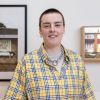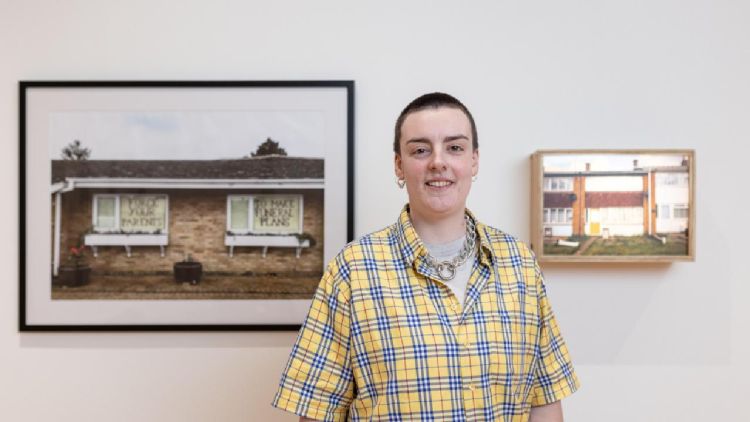
George Storm Fletcher
- Course: BA Fine Art
- Graduation: 2023
- Nationality: British
Please tell us a bit about yourself and your background?
I am originally from Ely in the Fens of South East England, but now live and work in Leeds. I am a printmaker, performance artist and painter and decorator. My work revolves around death, grief and DIY; as well as television, queer culture and politics. I enjoy gardening and cooking, and all forms of ‘making’, I love installing exhibitions, and the last minute rush to get everything on the wall. I really feel I have found exactly the right place for me right now, here in Leeds.
Why did you choose to study your particular course and why did you choose the University of Leeds?
After originally planning to do a joint honours in Sociology and English Literature, I took a year to complete an Art Foundation (a free course directly after A levels), and then another subsequent year to work and decide which city I would best find myself in. After these extra years following my A levels I realised that Fine Art was a way to bring all of my interests together. Art is a constellation of ideas, histories and politics – and is expressed both visually and creatively, but especially within the University of Leeds, it is a research based practice.
My Mum is originally from Burley in Wharfdale, and my Grandad lived in Ilkley and then Cottingley, Bradford. I was familiar with Yorkshire, and enjoyed the proximity of the University to the Yorkshire Dales. As soon as I applied to Leeds and was given a place in the School of Fine Art, History of Art and Cultural Studies, everything came together and made sense.

George with their work at Leeds Artists Show in 2023.
What has been the best aspect of your course so far?
Undeniably the Studio Practice module, and the ‘studio culture’ of my degree has been the most fun, and most transformative aspect of my degree. Talking with my peers in the studio, discussing ideas and problem solving together has provided a social sphere of likeminded creatives, and has meant that for the last four years I have regularly been involved in heated debates and talks about Art, the world…you name it, we talked about it. Through our own creative practices we had a common ground to build exhibitions together – and through this found a microcosm of brain power that I will really miss.
Can you tell us about some of the exciting projects you have completed as part of your degree?
For our final year degree show I was heavily involved in the curation, conception and execution of our show, Sitting with it. At times our meetings were stressful and we had a lot of organising and discussion to work through. But seeing it all come together, and inviting our loved ones into the space, and receiving such positive feedback has meant that the degree show has really shone through as the most exciting project of my degree.
I would also highlight my experiences working with the technical team in the basement of the School of Fine Art, History of Art and Cultural Studies, specifically my work with David Sowerby and Jubal Green in wood working. No matter how complicated an idea I have, or how outrageous a sketch I present them with, they have always both assisted and taught me how to create something. They are truly talented people and each project with them, (be it my flanged peep show box, my coffin or my lightbox,) has been a rollercoaster of learning opportiunities, mistakes and joy.
Have you worked closely with a particular tutor or member or the University’s academic staff? Tell us about that experience.
For my dissertation I worked with Dr Eric Prenowitz, he was my supervisor from start to finish.
I wanted to conduct first hand research for my project, in the form of a focus group of queer people who had seen the 2021 BBC drama Vigil. I then combined the focus group information with queer theory, and scenes from the show itself into my final paper.
Dr Prenowitz’s input was invaluable. Up until that point I hadn’t ever formally led a research project myself, and the discussions that we had about gender, Judith Butler, the role of telly and the purpose of research really reminded me of my love for reading and writing, critical thinking, and digesting difficult theory! I really enjoyed our supervision sessions, and felt challenged in the most positive way to really define and narrow down my writing, and find a space for my project in current discourses.
What activities outside of your studies were you involved in?
I would be lying if I said I had spent a lot of time outside of my School, so much have I enjoyed the wonderful world of the School of Fine Art, History of Art and Cultural Studies. But I have been employed as a Student Ambassador since my first year of university. The Education Outreach team organise for Ambassadors to go into schools and talk to usually Year 9 students about the creative industries. It also gives the children an opportunity to ask questions about university life, Leeds, student living and financial support, as well as entry requirements.
I have been into many schools surrounding Leeds and found it really refreshing to talk to so many children, from so many different backgrounds, about the role of art. Not only that, but I have also been involved in taking the Saturday Art Club to galleries, and supported them in workshops – and these off site opportunities have enriched my understanding of how sculpture, in particular, can assist in secondary education.
What would you say to students thinking about studying your course?
I would encourage people to choose Fine Art at Leeds because it is a 50/50 course, split between more academic studies, and practical work. I personally feel this is the best way to understand contemporary art practice, through visual, written and oral means. As it is an entirely self directed course it is perfect for people like myself who have lots of ideas and just need support to refine and conceive them! Our studios are not only beautiful, but also competitively large as an art school in this country, and the 24/7 access truly feels luxurious. I would say if you have wide ranging interests and a lot of drive, go for it!
What does Leeds as a city have to offer students?
Leeds is going to be City of Culture in 2023, and I think that whilst this is a fantastic recognition, and cash injection into the city, it has been a thriving cultural capital for a number of years now. We have world acclaimed galleries on our doorstep, as well as close proximity to most major cities in the UK. Yorkshire is a truly fantastic place to live, the rumours about people being friendlier are absolutely true, and the countryside and surrounding Yorkshire Dales mean it is very easy to take a break from city living when you need to.

What experiences at Leeds do you think have particularly helped with your career? (Or what experiences at Leeds do you think will help in securing a graduate role following graduation?)
I feel I have a competitive blend of practical and academic skills, which means I can apply for a wide range of jobs. In terms of networking too, I have met a lot of people since starting in Leeds in 2018, and having a good circle of people around you means lots of opportunities to exhibit and work. Leeds feels very friendly and open from this point of view, the community wants to welcome new people, and is enthusiastic about those who have found their home here.
Study abroad
Where did you undertake your study abroad year?
Leipzig Universität, Germany.
What was the best aspect of the year abroad?
Being in a completely new city, with it’s own artistic history of making, and it’s own language. Leipzig is a very beautiful place, the buildings are so different to Leeds, and the landscape is much flatter!
Do you have any advice for students considering taking a study abroad year?
Working on a language before you apply is essential, it would avoid the mad panic I had to learn as much German as possible in two months. You need to be really organised (which does not come naturally to me!)

